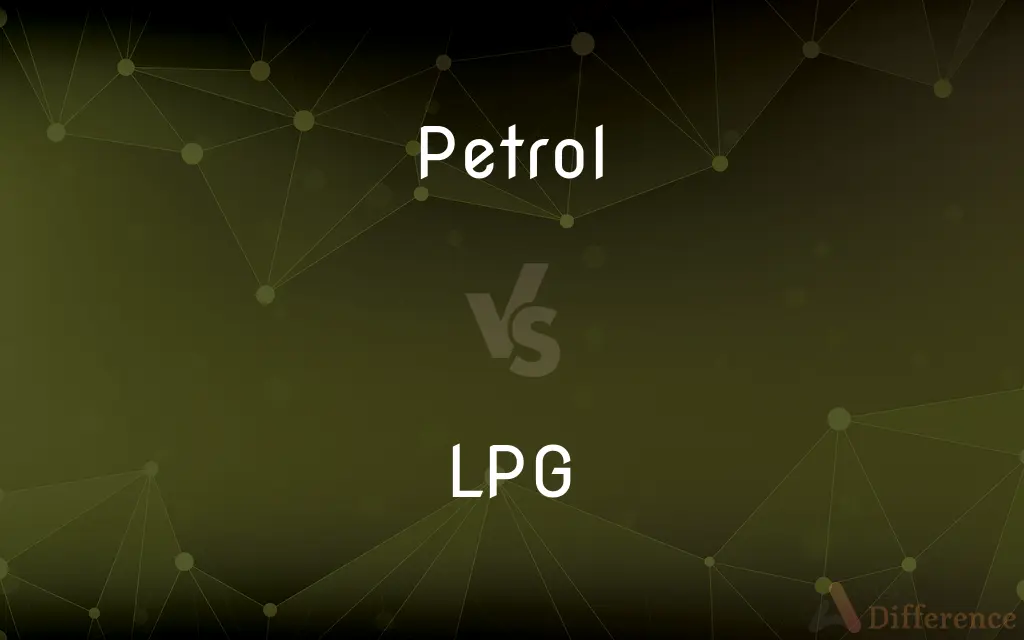Petrol vs. LPG — What's the Difference?
By Tayyaba Rehman — Published on November 24, 2023
Petrol is a liquid fuel derived from crude oil for internal combustion engines, while LPG (Liquefied Petroleum Gas) is a gas under pressure used for heating, cooking, and vehicles.

Difference Between Petrol and LPG
Table of Contents
ADVERTISEMENT
Key Differences
Petrol, commonly known in American English as gasoline, is a highly flammable liquid. It is primarily used to fuel internal combustion engines, such as those found in cars and motorcycles. LPG, on the other hand, stands for Liquefied Petroleum Gas and is a mixture of propane and butane gases stored under pressure to keep it in a liquid state.
Petrol is extracted from crude oil through the refining process, where it is separated from other components like diesel, kerosene, and lubricating oil. LPG is often a byproduct of this refining process but can also be produced during the natural gas extraction process.
The main applications of petrol revolve around transportation, powering vehicles with spark-ignited engines. LPG, in contrast, has broader uses. In residential contexts, LPG is often used for cooking and heating. It's also utilized as a fuel for certain vehicles, particularly in regions where petrol prices are high.
Petrol is usually stored in underground tanks at gas stations and is dispensed into vehicles through pumps. LPG, due to its gaseous nature, is stored in pressurized cylinders or tanks. When used as vehicle fuel, LPG requires a different kind of fueling system and engine modifications compared to petrol.
Comparison Chart
Form
Liquid
Gas (liquid under pressure)
ADVERTISEMENT
Composition
Refined crude oil
Propane and butane mixture
Primary Use
Vehicle fuel
Heating, cooking, vehicle fuel
Storage
Underground tanks
Pressurized cylinders/tanks
Byproduct of
Crude oil refining
Oil refining and natural gas processing
Compare with Definitions
Petrol
A liquid fuel for combustion engines.
She filled her car's tank with petrol before the trip.
LPG
A mixture of propane and butane.
LPG burners produce a blue flame, indicating complete combustion.
Petrol
Primary fuel for spark-ignition engines.
Petrol engines are known for their immediate acceleration.
LPG
Stands for Liquefied Petroleum Gas.
Many households use LPG for cooking purposes.
Petrol
Refined product from crude oil.
The price of petrol is influenced by global oil markets.
LPG
Often a byproduct of oil refining.
LPG production increases when refineries process more crude oil.
Petrol
Known as gasoline in the U.S.
In Europe, it's called petrol, but in the U.S., it's gasoline.
LPG
Stored in pressurized containers.
Handle LPG cylinders with care to prevent leaks.
Petrol
Stored in underground tanks at stations.
The petrol station near my home offers competitive prices.
LPG
Used in vehicles, heating, and cooking.
With the right modifications, cars can run on LPG.
Petrol
Gasoline.
Petrol
Petroleum, a fluid consisting of a mixture of refined petroleum hydrocarbons, primarily consisting of octane, commonly used as a motor fuel.
Petrol
(informal) A motor vehicle powered by petrol (as opposed to diesel).
Petrol
Petroleum.
Petrol
A volatile flammable mixture of hydrocarbons (hexane and heptane and octane etc.) derived from petroleum; used mainly as a fuel in internal-combustion engines
Common Curiosities
Can cars run on both petrol and LPG?
Some cars can be modified to run on both fuels with a dual-fuel system.
Which is more environmentally friendly: petrol or LPG?
LPG generally produces fewer emissions than petrol, making it more eco-friendly.
What are the primary components of LPG?
LPG primarily consists of propane and butane.
Is petrol a renewable resource?
No, petrol is derived from crude oil, which is non-renewable.
Can LPG be used in all vehicles?
Not all vehicles can use LPG; they require specific modifications or systems.
Why is LPG stored under pressure?
LPG is stored under pressure to keep it in a liquid state, making it easier to transport and use.
How is petrol stored at gas stations?
Petrol is stored in underground tanks at gas stations.
Are petrol engines different from LPG engines?
The basic engine can be the same, but fuel delivery systems and tuning may differ.
Is petrol the same as gasoline?
Yes, petrol is known as gasoline in American English.
What happens if LPG leaks?
LPG is heavier than air, so it can pool in low areas and pose explosion risks.
Why is LPG sometimes preferred for indoor use?
LPG produces fewer indoor pollutants compared to other fuels.
Can petrol and LPG be mixed?
No, they have different properties and require separate storage and delivery systems.
What's the octane rating of petrol?
The octane rating of petrol varies but typically ranges from 87 to 93 in the U.S.
Which fuel is more energy-dense: petrol or LPG?
Petrol is more energy-dense than LPG.
Share Your Discovery

Previous Comparison
Mozzarella vs. Buffalo Mozzarella
Next Comparison
Rust vs. SmutAuthor Spotlight
Written by
Tayyaba RehmanTayyaba Rehman is a distinguished writer, currently serving as a primary contributor to askdifference.com. As a researcher in semantics and etymology, Tayyaba's passion for the complexity of languages and their distinctions has found a perfect home on the platform. Tayyaba delves into the intricacies of language, distinguishing between commonly confused words and phrases, thereby providing clarity for readers worldwide.












































